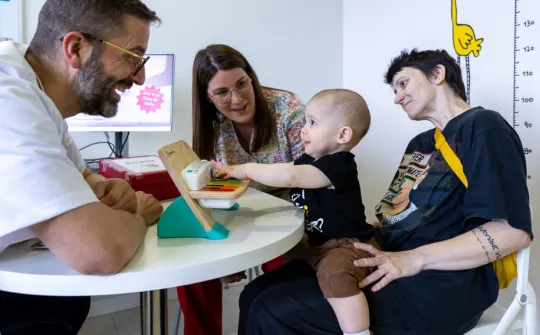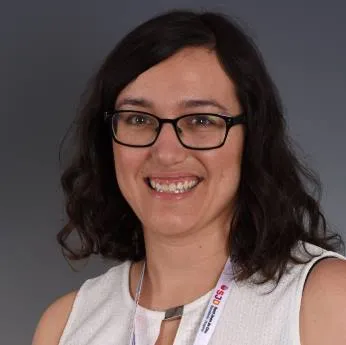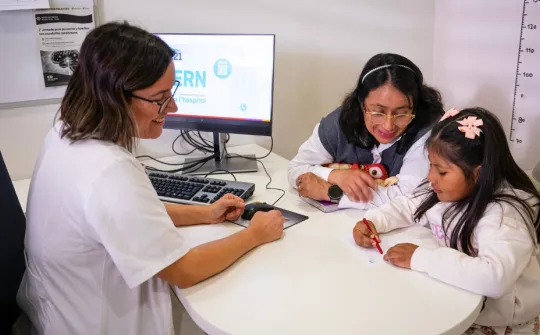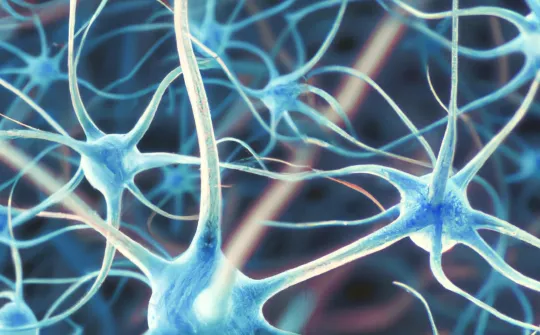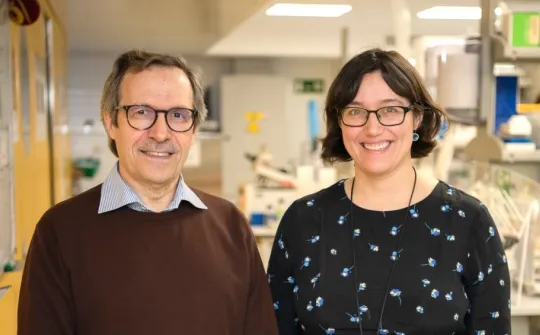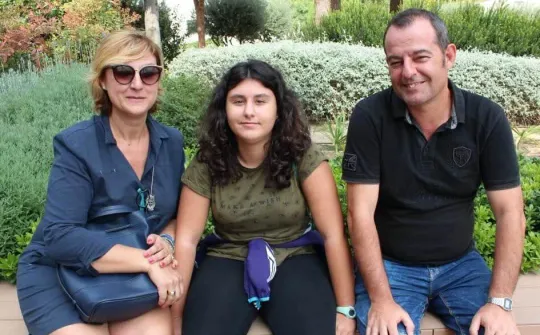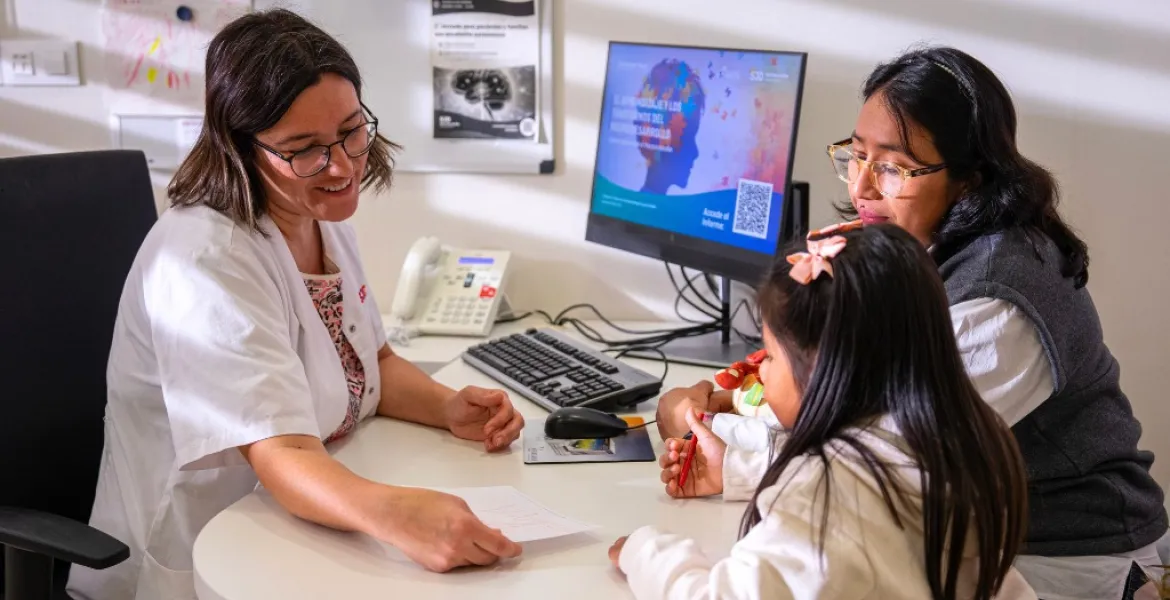
At the Neuroimmunology Unit of the SJD Barcelona Children’s Hospital we diagnose and treat inflammatory brain diseases that manifest in childhood and adolescence.
The Neuroimmunology Unit at SJD Barcelona Children’s Hospital, within the Neurology Service, was created in 2015, and focuses on medical care and research on inflammatory diseases of the brain in the paediatric age group. This includes autoimmune pathologies such as encephalitis caused by anti-NMDA receptor antibodies, demyelinating diseases, such as multiple sclerosis, and infections of the nervous system. Together with the Health and Immunology and Neurology Services, the team is part of the ERN-RITA group that brings together the main European centers with expertise in the diagnosis and treatment of minority immunological disorders.
This internationally acclaimed unit is possible thanks to our centre’s alliance with Hospital Clínic de Barcelona and the August Pi i Sunyer Biomedical Research Institute (IDIBAPS). The three centres form part of the Neuroimmunology Programme, which has biological research laboratories to identify the specific antibodies for these diseases.
The causes of these diseases are researched and new diagnostic tests and treatments are developed in the IDIBAPS facilities. The University of Pennsylvania, where the Programme coordinator (Josep Dalmau) works as a Neurology professor, is involved in many of our studies. The head of the SJD Barcelona Children's Hospital Unit, Thaís Armangué, is part of the International Pediatric Multiple Sclerosis Study Group (IPMSSG) European network for the study of multiple sclerosis and is also involved in the European consortium for the study of pediatric neuroimmune diseases.
Accreditations
- ERN-RITA, European Network for Rare and Complex Musculoskeletal and Connective Tissue Diseases.
Description
What are the autoinmune diseases?
An autoimmune neurological disease occurs when our defense mechanism attack the body itself, specifically the nervous system. In some pathologies, substances that are produced as a defense mechanism (called antibodies) can be detected through biological samples. This facilitates diagnosis and prognosis of the problem and makes it possible to determine the need for further treatment. Although in most cases the cause of this abnormal activation of the immune system is unknown, in some cases the trigger may be a tumor or an infection.
What are neuroinfections?
These are infectious diseases such as those caused by viruses or bacteria, which in some cases affect the brain. In many diseases, there is an inflammatory element due to the body itself trying to fight the infection. Neuroinfections include a wide range of diseases, including bacterial meningitis, viral encephalitis and HIV with neurological manifestations.
When a child or adolescent suffers from an autoimmune disease or a neuroinfection, inappropriate detection or diagnosis may aggravate the sequelae, which could affect these patients in the long-term. Determining the type of disease concerned as quickly and accurately as possible and administering the appropriate treatment is important in preventing complications. There are three main groups of disease for which we carry out treatment and research in the Neuroimmunology Unit:
- Acquired demyelinating diseases. This includes diseases such as multiple sclerosis and neuromyelitis optica.
- Paediatric autoimmune encephalitis. In certain forms, the prevalence in children can reach up to 50% of the people affected, as is the case for acute disseminated encephalomyelitis (ADEM), which often manifests itself in childhood.
- Neuroinfections. These are caused by a wide range of diseases, including herpetic encephalitis, neurological diseases caused by cytomegalovirus (CMV), congenital infections and patients suffering from HIV with neurological manifestations.
Why SJD Barcelona Children's Hospital?
The SJD Barcelona Children’s Hospital and Hospital Clínic Neuroimmunology Unit is internationally recognised thanks to the prestige of both hospitals and its leading specialists in childhood and adolescent neurological diseases
We work to comprehensively care for the patients and their families, who need information and support throughout the whole process.
We care for paediatric patients in a coordinated manner
We work to comprehensively care for the patients and their families, who need information and support throughout the whole process.
Both centres attend joint meetings and discuss the child and adolescent cases that have been admitted to SJD Barcelona Children’s Hospital. This enables us to benefit from the experience of the professionals and provide an accurate diagnosis of these diseases, which have some distinctive characteristics in early childhood.
Our professionals are leaders in the diagnosis and treatment of pediatric neurological diseases
We have an internationally recognised team
Our professionals are leaders in the diagnosis and treatment of pediatric neurological diseases
We receive samples from centres all over the world, in some cases from hospitals that are requesting a second opinion or confirmation of their diagnosis. The diseases we treat are highly complex and require sophisticated diagnosis and treatment methods. The work of the Visual Pathway and Advanced Imaging laboratory is vital in determining what disease each person suffers from and providing them with better therapeutic treatment.
Our laboratory, managed by Thaís Armangué, is exclusively dedicated to the study of this type of disease. The coordinator of the Unit, Josep Dalmau, is one of the leading specialist researchers in this type of disease and one of the most cited in scientific publications worldwide. In the last decade, we have discovered 12 previously unknown diseases.
We work in coordination with specialists from various services and units of the Hospital
We provide an accurate diagnosis
We work in coordination with specialists from various services and units of the Hospital
The diseases we treat are highly complex and require sophisticated diagnosis and treatment methods. Our unit works in constant coordination with specialists from the Neurology, Ophthalmology, Rheumatology and Clinical Immunology departments, among others.
The differential diagnosis of these diseases is difficult as the symptoms that could occur are similar to those of metabolic or genetic diseases that manifest themselves in early childhood. Collaboration with the metabolic disease, movement disorder and genetic-based rare disease units enables us to properly screen each case.
The diagnostic techniques and treatments that we apply are adapted to the age of the patient
We personalise treatment, adapting it to our paediatric patients
The diagnostic techniques and treatments that we apply are adapted to the age of the patient
For years, failure to detect neuroimmune diseases has led to some specialists prescribing inappropriate treatments. Our accumulated knowledge and experience enables us to choose the most effective therapeutic options with the aim of preventing complications or reducing the neurological damage in cases where this is a possibility.
The majority of cases are treated with immunotherapy (either using immunomodulators or immunosuppressants), with the aim of eliminating the antibodies that attack “by mistake” and the cells that produce them. The majority of treatments lower the patient’s defences, making it important that the treatment is managed and controlled.
Our patients continue treatment at Hospital Clínic de Barcelona when they reach adulthood.
We support children in their transition to adulthood
Our patients continue treatment at Hospital Clínic de Barcelona when they reach adulthood.
Many of the diseases we treat are chronic and requite monitoring throughout the patient’s adult life. For this reason, we believe it is vital to share healthcare protocols, both diagnostic and therapeutic, between the adult and paediatric treatment units.
Specialties and services
The Neuroimmunology Unit diagnoses, treats and studies diseases that involve inflammation of the brain and/or that cause anomalies in immune system responses, in some cases developing antibodies against white matter neurons or proteins.
We have divided autoimmune diseases and neuroinfections into six groups, which include the following:
Demyelinating diseases
Diseases characterised by an inflammatory condition affecting the myelin, also called white matter, which regenerates the neuronal axons. Once the diagnosis is made, we evaluate the risk of a new episode occurring. If necessary, we start treatment with the aim of preventing possible future episodes. The most frequent disorders that can be caused by myelin disorders include: Multiple Sclerosis (MS), Neuromyelitis optica spectrum diseases, Acute disseminated encephalomyelitis (ADEM), Other demyelinating diseases
Paediatric autoimmune encephalitis
This type of disease mainly affects grey brain matter (neurons). In the majority of cases the cause is currently unknown. Our group recently discovered that a large proportion of these are caused by protein antibodies that are found on the surface of the neurons. They can have a wide range of symptoms which include movement disorders, psychiatric symptoms and epileptic seizures.
Neuroinfections
Some types of infection affect the central nervous system. They can be caused by bacteria, viruses, fungus or parasites. The origin or cause, due to which a small percentage of patients are seriously affected by these agents seriously, is currently being investigated. In some of these diseases, the patient’s inflammatory response can cause deterioration and neurological symptoms. Our main lines of research focus on the following diseases: Herpetic encephalitis, Congenital disease caused by cytomegalovirus (CMV)
Paediatric paraneoplastic syndromes
Heterogeneous group of neurological disorders that are seen in patients with neoplasms, generally undiscovered at the time the neurological symptoms appear. An example is opsoclonus myoclonus syndrome, which may be associated with a neuroblastoma.
Autoimmune diseases of the peripheral nervous system
Some autoimmune diseases affect the peripheral nerves causing weakness and gait disorders. This is the case with Guillain-Barré Syndrome and chronic inflammatory demyelinating polyneuropathy (CIDP). In some of these diseases we can also find associated antibodies.
Other inflammatory diseases of the central nervous system
- Certain diseases, due to a mutation in a gene that controls inflammation, lead to permanent activation of the immune system, which causes inflammatory and autoimmune neurological conditions. This occurs in genetic-based diseases such as Aicardi Goutieres Syndrome and in autoinflammatory and primary immunodeficiency diseases.
Other systemic inflammatory diseases of unknown origin, such as systemic lupus erythematosus, vasculitis and Behçet’s disease may also cause neurological problems due to inflammation of the nervous system.
Our professionals
The Neuroimmunology Unit at SJD Barcelona Children’s Hospital brings together professionals from a number of different departments. We provide multidisciplinary care, liaising constantly with the Neurology Department.
We also work together with the Psychiatry and Psychology, Oncology, Neonatology, Allergology and Clinical Immunology, Rheumatology, Radiology and Microbiology Laboratory teams, among others.
Our unit’s work wouldn’t be possible without the dedication of the Hospital Clínic - IDIBAPS Neuroimmunology programme team, which includes neurologists, researchers and laboratory technicians.
Research
In order to provide our patients with the best care and most innovative treatment, the Neuroimmunology Unit takes part in clinical trials that professionals believe may benefit our patients through the Clinical Research Unit.
We work together as part of the of the August Pi i Sunyer Biomedical Research Institute (IDIBAPS) neuroimmunology group in basic and translational research, which we conduct in laboratories managed by the Institute. Our aim is to find new diagnostic, prognostic and therapeutic tools to respond to inflammatory and autoimmune diseases.
We are currently leading several clinical and basic research studies on these types of disease. The following studies, in which more than 40 hospitals are taking part, are currently in progress:
- Study of autoimmunity in herpetic encephalitis. National multicentre analysis in paediatric and adult patients with herpes simplex encephalitis. Coordinated by IDIBAPS, funded by the Mutua Madrileña Foundation.
- Study on synaptic autoimmunity as a cause of psychosis, epilepsy and post-herpes encephalopathies in childhood. National multicentre research that includes all types of encephalitis in children. Coordinated by IDIBAPS, funded by the Spanish Paediatrics Association (AEP).
- Study of diagnostic and prognostic markers in multiple sclerosis and other demyelinating paediatric diseases. Coordinated by the Clínic Foundation in collaboration with the Multiple Sclerosis Centre of Catalonia (CEMCAT) and funded by TV3’s La Marató Foundation.
